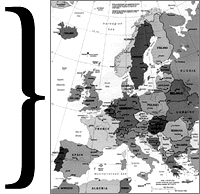The state of the scene in Eastern Europe.
| The size of the warez scene in Eastern Europe has been steadily increasing since 1989. Prior to 1989 trading was confined to just a few little groups which worked exclusively in Easter Europe. Like the rest of the scene in 1989, all of them were using pbx, calling cards and blue boxes to support their boards. In 97 ISDN and the occasional satellite connection (rarer because of its high price) are the tools of choice. From personal experience I can say that the ones who dominate usually have connections of at least 56kpbs. Faster connection are still uncommon, a big problem in eastern Europe, and one which has had a big effect on the way our scene works. |  |
| Most people use modems and connect with a server owned by a
monopolist -telecommunication firm. The connection is terrible (prone to
disconnecting and often busy) and too slow (max. 33.600 kbps). Telephone bills
are also very high in Eastern Europe, because all the countries here have only
one big telecommunication firm (like TPSA in Poland). As you can
guess, the level of service is very, very poor. Users have difficulty connecting
to the internet and can't stay connected to boards long enough to trade
decently. Despite these many problems, the Easter European scene has improved
considerably over the last year. Every country in Eastern Europe has a number of groups, but most are more interested in pressing and selling cds than competing on sites. Cds are recorded with the latest releases, and then sold at local computer markets. Selling Cds is very common because it's accepted by the community, and the police don't bother to enforce copyright laws. The most popular warez groups in Eastern Europe for games are Razor 1911, Paradigm, Hybrid, Class, and for utils Pirates with Attitudes, Drink or Die, and X-Force provide the bulk of the releases. In addition to release groups, Reality Check Network (emags), The Hacker Choice (hacking and releasing utilities), United Cracking Force, and Phrozen Crew (cracking) are very popular too. People who begin working in the computer market and have never heard of the scene, begin to have contact with it first through *.nfos and soon after through the websites maintained by release groups. The scene in Eastern Europe is still very tied to the boards. The legendary Polish board "Are You Sure?" was the starting point for many Polish crackers, hackers, and coders, maybe most. The board was up for 5 years and used to have contact with big name groups like Amnesia, Parasite, Tri Star and Red Sector. "Are You Sure?" staff shared experiences, warez and information with many other great boards (located in Sweden, Belgium, France, Germany, Russia, USA and Canada). "Are You Sure?" was located in a very big government institution (the main sysop worked there) and received at least 200 megs a week (which for Europe at the time was a very very high volume). "Are You Sure?" was a central point for the entire scene in this region (excluding Russia - where DOD's and Motiv8's were the biggest boards).Unfortunately when the sysops changed their jobs, the board went down. My own experience with the scene has been somewhat short (about 3 years) but unusual because I've spent all of it in the PC scene. Amiga has never interested me, though I know and respect a lot of people from the Amiga scene because I think the Amiga scene has a very great tradition. I don't know why the Amiga is now more popular in Eastern Europe than the PC. I've talked with my friends from Czech and Hungary and they say it's the same where they are. In Eastern Europe people don't hear much about the PC scene, so maybe that's why the Amiga is so dominant. Obviously, the Amiga scene isn't a very good fit with the PC scene with respect to couriering or supplying. To build a strong Eastern European scene we'll need help from the big release and courier groups, but as the level of skill and connection speeds rise, that'll happen. Meanwhile when we ask randomly chosen people from Eastern Europe "What do you think about warez?", the answer is "It's OK!" or "cool." The situation is different from the one in West in Europe where people aren't so enthusiastic, and very often hate everything concerning the scene (especially the warez). So I'm waiting now for the time when people from my region will start to cooperate with the internationally known scene groups., and I think that this time isn't very far off. The number of people with a desire to be part of the international scene is increasing. Hopefully we'll be able to add our methods and abilities to it in the near future. _/\-> kot <-/\_ |